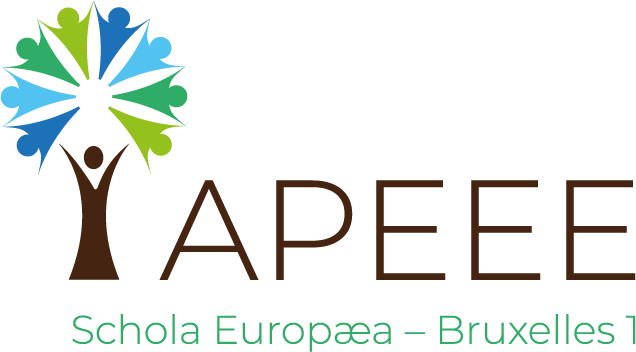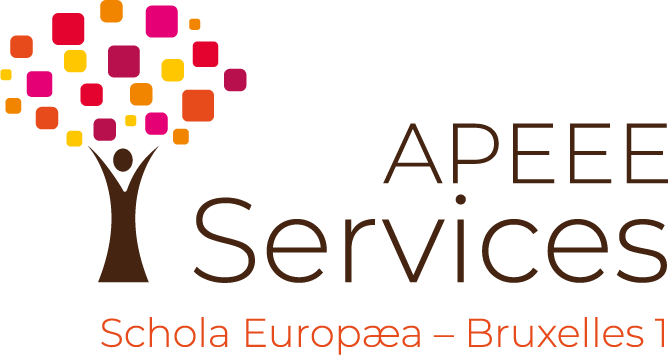Interview on Solar Panels with Students' Committee President and Vice-President
Interview on the installation of green solar panels in EEB1 with the President and the Vice-President of the Students’ Committee (CdE), Ilan Einstoss Pato and Magnus Sorensen-Taylor, by Eszter Rumbold-Molnár on behalf of the APEEE

Photo: Ilan (centre) and Magnus (right) in the CdE office
As it was recently announced by EEB1 Director Mr. Brian Goggins, our school turned greener this spring by starting to use solar panels, which will also save us electricity costs.
The Solar Panel project at EEB1 started by the initiative of the CdE (the Students’ Committee). We met CdE President and Vice-president, Ilan Einstoss Pato and Magnus Sorensen-Taylor in February, before the outbreak of the pandemic, to learn about the details of the project.
We took the opportunity to ask Ilan and Magnus about the role of the CdE within the school too. Our meeting took place in the CdE’s office, which is situated in the building of the Villa in the EEB1 Campus.
Could you explain what exactly CdE stands for and what it represents within the EEB1?
ILAN: CdE stands for Committée des Élèves (an abbreviation in French), which in English means the Students’ or Pupils’ Committee. There are altogether 80 students in the CdE at the moment who are composed of a wide variety of students from different sections and years from S4 to S7.
MAGNUS: The CdE represents the students’ interests when it comes to the higher powers, so when we go for example to meetings with the Director or the Administrative Board. We also try to engage ourselves in projects for students that the students want to have. In all aspects we try to serve the students of our school.
When did you start your mandate as President and Vice-president of the CdE?
ILAN: At the beginning of each academic year there are general elections where every student from S1 to S7 is able to vote. That’s when the presidential duo is elected. This year we happened to win. We started our mandate at the beginning of October, the old presidency stayed until the end of September.
Traditionally the general elections are preceded by an internal vote within the CdE before the end of the previous year. There the three candidates running in the general elections are voted for.
How is the CdE structured and in which fora do you represent the interests of the students?
ILAN: Once the presidential duo is elected, three posts are voted for internally: the treasurer, who is responsible for finances, and the two CoSUP representatives. These two represent the CdE of EEB1 at the Conseil Superieur des Élèves (CoSUP) of the European Schools. [This body is the students’ voice at the Joint Teaching Committee meetings of the Board of Governors of the European Schools].
As for within our school, there are main meetings that happen mandatorily every year where students, as well as teachers, parents and the administration of the school are altogether present. These are the Conseil d’Education, the Administrative Board, the School Advisory Council and the Hygiene and Security Committee.
There are also other meetings and working groups in all of which we are present as student representatives. The Conseil d’Education for example this year agreed on 5 working groups where we work on different objectives and try to provide solutions. These are the Vending Machines, the Homework Policy, the Phone Policy, the Communications Policy and the Child Protection policy working groups.
What concrete projects are you currently working on within these working groups?
MAGNUS: One of the projects that we agreed on at the Conseil d’Education is the Cards project. Here we want to find solutions for the students to have more freedom to leave school and that could also help solve the overcrowding problem in the area of the school.
ILAN: We also have the Vending machines project which is about to put out vending machines of certain products in the school area to complement the cafeteria’s supply which is rather overloaded at the moment.
MAGNUS: A recent project is to set up an Inter-school Sports Tournament League, where there will be multiple sports with the participation of EEB1, EEB2, EEB3 and EEB4.
ILAN: We also look seriously into maintenance and hygiene, help reorganize the S4-S7 library and possibly find a solution to have more places for students in the corridors to be able to sit down and relax.
You have also had the Solar Panels project. Where did the idea come from and at what stage it is at the moment?
ILAN: We have got the idea of the solar panels from fellow students in the EEB3 European School. We knew that they already had those on their buildings. In November last year, when I went to the CoSUP Meeting of all European Schools, I spoke with their representatives who recommended the organization Sun for Schools.
After doing some research we brought the project to our Director Mr. Goggins. He thought it was a wonderful initiative and started the process within the school. They expressed interest to Sun for Schools and then carried out the rest with them. They already signed the contract I believe. [Not only the contract has been signed but EEB1 Director announced in May that the panels were installed in EEB1.]
Could you explain the essence of the Solar Panel project?
ILAN: Sun for Schools is a non-for-profit organization that installs solar panels in schools free of charge and maintains them for 25 years under special conditions.
The way it works is that they install the panels and for the first 10 years they recuperate the green certificates, which the Belgian government provides so as to get their money back for their investments. They also take a part of the money the school saves with the solar panels.
If it previously costs 100 000 a year for electricity for example, and the school now only has to pay 90 000 because of solar panels, they are going to need to take 5000 EURs. In the end the school pays only 95 000, which is still better than before, it’s a win-win. Until they have the money back for their original investment which is usually a duration of 10 years.
Afterwards Sun for Schools guarantees and maintains the solar panels for a time of minimum 25 years. During those first 10 years the solar panels are owned by them, but afterwards the ownership is transferred to the school.
Where exactly are they going to be installed?
MAGNUS: Sun for Schools did a technical analysis of all the buildings of the school, but unfortunately not all can hold solar panels for all sorts of technical reasons. They are going to install the maximum amount possible, and that means on top of the Bruegel and the Michelangelo buildings.
So part of the electricity of EEB1 will then come from these solar panels?
ILAN: Exactly.
Going back to your work in the CdE. As far as I know, this room where we are sitting at the moment is your office?
ILAN: Yes, this is our office, this is the CdE office. When the new President and Vice-president is elected, there is a changing of the guards so to speak, so we sign the statutes with the old presidency and then the keys are handed over.
Usually the previous presidency remains influential in our statute. For example in case of a dispute among CdE members, the previous presidency are the ones to resolve it. They often stay actively involved in our work as well, for example last year’s President László [Molnárfi – RME] this year is one of our CoSUP representatives.
Can you tell more or less how much time do you dedicate to your work at the CdE, let’s say weekly?
ILAN: Personally I dedicate I would say some 30 minutes a day on average for CdE work, and there are of course the meetings that happen really often, at least one or two a week, where we or I might be at present. Some are mandatory, some just necessary. But that could go from 30 minutes to anywhere.
For example the Hygiene and Security Committee meeting that was last Thursday went from 8 o’clock till 10.30. So that was two hours and a half just one day, and afterwards we have to make our own internal report etc.
MAGNUS: It just depends how dedicated and motivated you as a presidential duo want to be. At the end it depends from person to person, from week to week, some weeks less, some weeks more.
Which grades are you in?
ILAN: S6 English section.
MAGNUS: S6 Danish section.
The way you have spoken, you seem really like feeling an integral and important part of this school community?
ILAN: Absolutely! If I did not have lessons, I would really feel like another person who is part of the administraion. We have got all the same meetings, we get the same treatment, we get the same reports. We could be deputy directors for student management! (They both smile.)



